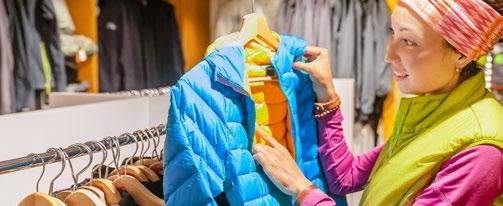
4 minute read
INTERNATIONAL TRADE PRIORITIES
A stable and predictable U.S. federal trade policy is critical to helping outdoor companies lower costs, create U.S. jobs, and fuel the development of new, innovative outdoor apparel, footwear, and equipment. OIA advocacy on trade is guided by our “balanced trade agenda”:
• We support the elimination of import tariffs on outdoor products where there is no viable domestic production.
Advertisement
• We support policies to help our “Made in USA” members compete in a global economy. Consistent with policy that supports global value chains and domestic manufacturers, we urge Congress and the administration to support federal tariff reform and specific initiatives that relieve outdoor businesses of the disproportionately high and unnecessary import taxes that stifle innovation, suppress U.S. jobs, and artificially inflate retail prices on outdoor products. These actions include the following:
• A long-term renewal of the Generalized System of Preferences (GSP) and a refund of duties paid since January 1, 2021
OIA led the effort to make backpacks, sports bags, and other travel goods duty-free from GSP-eligible countries, resulting in $300 million in duty savings in 2020 and a $5 billion shift of trade in travel goods out of China to countries like Indonesia, Thailand, and the Philippines. Since GSP expired at the end of 2020, however, outdoor companies have paid an estimated $1.65 billion in duties on eligible products.
These funds could have been used to create new U.S. jobs, develop innovative, hightech outdoor products and spur economic growth. Frequent and long-term expiration of the GSP program disincentivizes maintaining, developing, or expanding production in GSP beneficiary countries.
We urge Congress to renew GSP now, refund duties paid since the end of 2020, and approve at least a six-year or longer extension.
• Reform of the GSP Competitive Needs Limitations (CNL).
Brands, travel goods’ producers in Indonesia, and eventually other GSP countries are or will be at risk of losing duty-free benefits for products exceeding certain builtin import thresholds, known as Competitive Needs Limits (CNL). The CNL limit is triggered when the value of U.S. imports from a beneficiary country of the eligible product either equals or exceeds 50 percent of total value of world imports of that U.S. Harmonized Tariff Schedule subheading in a calendar year or exceeds an annually determined dollar value threshold amount that increases $5 million per calendar year.
Outdoor companies primarily use GSP for travel goods: backpacks, hydration packs, and duffle bags. Trade from Indonesia of these items has already surpassed the CNL threshold for a review this year. If the CNL is triggered, stakeholders can apply for a waiver. Nevertheless, OIA believes Congress should reform the CNL process to prevent loss of duty-free status.
We urge Congress to update the CNL threshold by raising the dollar value threshold limit for triggering a CNL review and making it easier to return a product to duty-free status if imports dip below the CNL threshold.
• Passage of a package of miscellaneous tariff bills (MTBs) that will provide temporary duty relief on certain outdoor products and preserve finished products for future MTB rounds.
MTBs reduce or suspend import duties on certain products, including inputs and some finished products, for three years. Petitions for MTBs are fully vetted by the administration to ensure that there is no domestic production of the covered product and duty savings on each MTB do not amount to more than $500,000.

A package of MTBs that meets these criteria is then submitted to Congress for its approval. Past MTBs have saved outdoor companies $40 million, which led to lower costs, product innovation, and more American jobs. Eight footwear MTBs developed and submitted by OIA, covering a wide range of outdoor performance footwear, were included in a package of MTBs that has been pending before Congress since 2020. Failure to pass this package of MTBs has raised costs for outdoor companies and consumers and hampered innovation.
We urge Congress to pass his package of MTBs, refund duties paid on eligible products, authorize a new MTB-round and preserve the use of finished goods in MTBs.
• Supporting a new process to exclude imports from the China 301 tariffs and provide relief for small and medium-sized businesses.
We share long-held concerns by the administration and Congress about China’s intellectual property practices and forced technology transfers. We do not believe the continued maintenance of the 301 tariffs on American companies is the right approach to address this matter. Since 2018, when the 301 tariffs were enacted, outdoor companies have paid $7.4 billion in punitive tariffs on top of normal duties, including an additional $2 billion in 2022 alone. These extra taxes, on top of already outdated and unnecessarily high import tariffs on outdoor products, raise costs, stifle innovation and U.S. job growth, and put outdoor products out of reach for many consumers. OIA continues to call on the administration to remove all China 301 tariffs from outdoor products.
As we continue to call on the administration to remove all China 301 tariffs from outdoor products, we urge Congress to establish a new exclusion process to give stakeholders the opportunity to make the case that certain products exempt from the punitive tariffs.

• Support a level playing field for U.S. Foreign Trade Zones (FTZs) and de minimis
U.S. e-commerce distribution operations are fleeing to overseas locations. This has already resulted in an estimated 207,000 jobs lost; this number is expected to double by 2024. Furthermore, these numbers do not reflect the lost job-growth opportunities in this industry.
This can be reversed through a technical fix to allow Section 321 de minimis entry for U.S. FTZs. The proposed technical fix will also alleviate Customs and Border Patrol (CBP) compliance concerns. Unlike foreign distribution, U.S. FTZs are under CBP supervision and must adhere to strict regulatory standards. Thus, shipments originating from U.S. FTZs are significantly less likely to contain counterfeit and fraudulent contents or products not in compliance with U.S. forced labor laws.
We urge Congress to level the playing field and support de minimis entry for U.S. FTZs.








